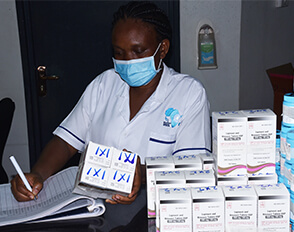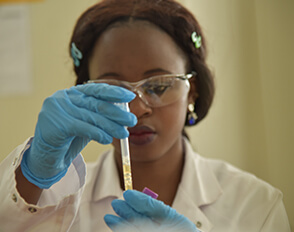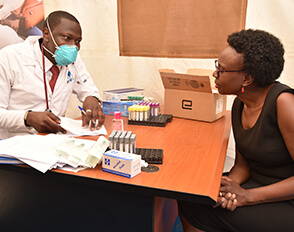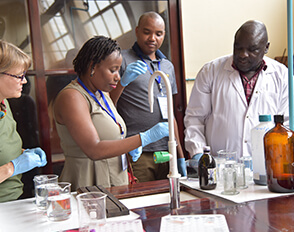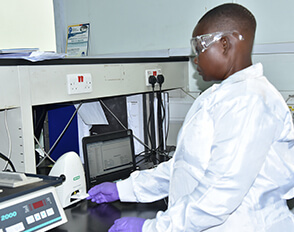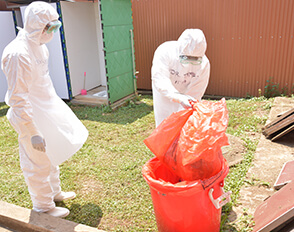This project is part of the EDCTP2 programme supported by the European Union
Antiretroviral therapy outcomes, barriers and facilitators of adherence and linkage to care among individuals initiating treatment following test and start guidelines in an urban HIV clinic in Uganda (ABOUT Project)
This is a Career Development Fellowship, granted to Dr. Jane Francis Namukasa Wanyama with award number TMA2016CDF-1602. The study’s overall aim is to establish treatment outcomes, barriers and facilitators for linkage into care and adherence to ART among individuals initiating ART under “Test and Start” guidelines in five urban HIV clinics in Uganda. It is a mixed methods study combining both qualitative and quantitative methods. The quantitative aim involves retrospective analysis of medical records of all adult HIV-positive individuals initiated on ART at Kisenyi Health Centre IV, Kawaala Health Centre III, Kiswa Health Centre III, Kisugu Health Centre III and Komamboga Health Centre III between January 2017 and January 2018. The qualitative aim assesses barriers and facilitators for linkage into care and adherence to Antiretroviral therapy. Read More
Leveraging capacity for early phase clinical trials for filoviruses in Uganda (CAPA-CT2 Project)
The CAPA-CT 2 project aims to generate knowledge relevant to the potential spread of the EVD outbreak in Democratic Republic of the Congo (DRC) to the Republic of Uganda. First, the project intends to improve knowledge of the mechanism of action of a prioritised drug by generating local clinical pharmacokinetic data that is needed for interpretation of pharmacokinetic data generated through MEURI, drug interactions with antiretroviral drugs and to inform future treatment optimisation approaches. Second, the project seeks to use diagnostic approaches to strengthen surveillance for especially dangerous pathogens in Uganda. Read More
Diagnosis and treatment of non-communicable diseases and geriatric syndromes in the HIV ageing population in sub-Saharan Africa (HASA Project)
The study proposal aims to build capacity for the detection and care of non-communicable diseases and geriatric syndromes the geriatric HIV positive population in sub-Saharan Africa. HIV infected individuals are at higher risk of “non AIDS” complications such as multiple non-communicable diseases; non-communicable diseases also often increase with age. Additionally, HIV infection itself seems to be associated to an accelerated aging process, due to multiple factors such as chronic inflammation and long term drug exposure.
Within this proposal a cohort of HIV positive aging patients ≥60 years (Geriatric cohort) will be established in order to capture non communicable diseases, and their risk factors. Participants of the geriatric cohort will be screened for hypertension, cardio vascular disease (annual ECG screening), respiratory disease (peak flow meter screening and spirometry), renal disease (proteinuria and creatinine clearance), and cancers (complete skin evaluation, pap smear, faecal occult blood, breast exam) (Aim 1). Read More
Career Development Fellowship (Fellow: DR. STEPHEN WALIMBWA)
The EDCTP-TDR Research & Development Fellowship supports researchers and key members of clinical trial research teams from Low and Middle Income Countries (LMICs) to acquire specific skills in clinical research and development through placements in pharmaceutical companies, product development partnerships (PDPs) and research institutions. Dr. Walimbwa was hosted for one year at the Novartis Institutes for Biomedical Research (NIBR) in Basel, Switzerland. Under the mentorship of NIBR scientists within in translational medicine, he was part of clinical trials that provided early proof of efficacy in humans and clinical trials that profiled the safety, tolerability, pharmacokinetics (what the body does to the drug), and pharmacodynamics (effect of the drug on the body) of novel compounds. Some of these novel compounds will be key in management of autoimmune diseases, neglected tropical diseases, malaria and rare diseases. Read More
Safety and efficacy of high-dose rifampicin in TB-HIV co-infected patients on efavirenz-based antiretroviral therapy (SAEFRIF Project)
Tuberculosis (TB) is a public health burden that causes substantial morbidity and mortality particularly in sub-Saharan Africa. Although there have been considerable advances in TB control new advances in TB treatment are needed. A growing body of evidence has indicated that the current dose of rifampicin (10mg/kg) is inadequate. Several studies have suggested that dose escalation (to 20-35mg/kg) is safe, and that higher doses (35mg/kg) may accelerate clearance of TB bacteria from the sputum of infected individuals. However, these studies have almost entirely been completed on HIV negative TB patients, or TB-HIV co-infected patients without severe immunosuppression who are not yet receiving antiretroviral therapy (ART). Read More
Tracing non-retained HIV-positive pregnant women and their babies (LOCATOR Project)
The use of Antiretroviral therapy for life among HIV positive pregnant women was recommended by WHO, referred to as Option B+. The success of Option B+ has been reported in many sub-Saharan countries and Mother to Child Transmission (MTCT) rates as low as 2.5% have been reported in Uganda. Despite the noted successes, high levels of attrition of mothers, particularly in the post-partum period, have been observed. In Ugandan health facilities, dropout rates of pregnant women or those in postpartum phase range between 10% – 40%. Little is known about the outcomes of mothers who disengage from care, the status of their exposed children as well as drivers for disengagement. Read More
Vulnerable population tuberculosis anti-retroviral (VirTUAL Project)
A research to determine the optimal dose of atazanavir (boosted with ritonavir) when used in combination with rifampicin-based TB treatment in children, adolescents, and pregnant or breastfeeding women. Read More

